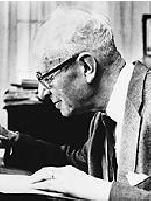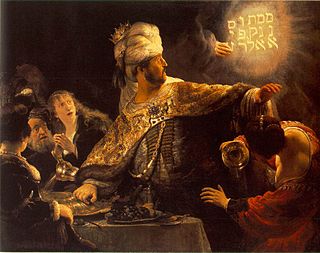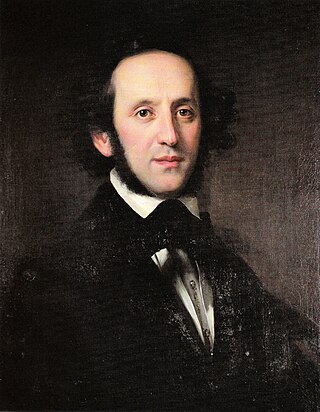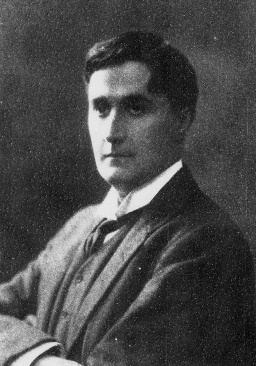Related Research Articles

The Creation is an oratorio written in 1797 and 1798 by Joseph Haydn, and considered by many to be one of his masterpieces. The oratorio depicts and celebrates the creation of the world as described in the Book of Genesis.

Mario Castelnuovo-Tedesco was an Italian composer, pianist and writer. He was known as one of the foremost guitar composers in the twentieth century with almost one hundred compositions for that instrument. In 1939 he immigrated to the United States and became a film composer for Metro-Goldwyn-Mayer for some 200 Hollywood movies for the next fifteen years. He also wrote concertos for Jascha Heifetz and Gregor Piatigorsky.

Belshazzar's Feast is a cantata by the English composer William Walton. It was first performed at the Leeds Festival on 8 October 1931, with the baritone Dennis Noble, the London Symphony Orchestra and the Leeds Festival Chorus, conducted by Malcolm Sargent. The work has remained one of Walton's most celebrated compositions. Osbert Sitwell selected the text from the Bible, primarily the Book of Daniel and Psalm 137. The work is dedicated to Walton's friend and benefactor Lord Berners.

Lobgesang, Op. 52, is an 11-movement "Symphony-Cantata on Words of the Holy Bible for Soloists, Choir and Orchestra" by Felix Mendelssohn. After the composer's death it was published as his Symphony No. 2 in B-flat major, a naming and a numbering that are not his. The required soloists are two sopranos and a tenor. The work lasts almost twice as long as any of Mendelssohn's purely instrumental symphonies.

Johann Sebastian Bach composed the church cantata Jauchzet Gott in allen LandenBWV 51, in Leipzig. The work is Bach's only church cantata scored for a solo soprano and trumpet. He composed it for general use, in other words not for a particular date in the church calendar, although he used it for the 15th Sunday after Trinity: the first known performance was on 17 September 1730 in Leipzig. The work may have been composed earlier, possibly for an occasion at the court of Christian, Duke of Saxe-Weissenfels, for whom Bach had composed the Hunting Cantata and the Shepherd Cantata.

Gott ist mein König, BWV 71, is a cantata by Johann Sebastian Bach written in Mühlhausen when the composer was 22 years old. Unusually for an early cantata by Bach, the date of first performance is known: at the inauguration of a new town council on 4 February 1708.

Hodie is a cantata by Ralph Vaughan Williams. Composed between 1953 and 1954, it is the composer's last major choral-orchestral composition, and was premiered under his baton at Worcester Cathedral, as part of the Three Choirs Festival, on 8 September 1954. The piece is dedicated to Herbert Howells. The cantata, in 16 movements, is scored for chorus, boys' choir, organ and orchestra, and features tenor, baritone, and soprano soloists.

The Five Mystical Songs are a musical composition by English composer Ralph Vaughan Williams (1872–1958), written between 1906 and 1911. The work sets four poems by seventeenth-century Welsh poet and Anglican priest George Herbert (1593–1633), from his 1633 collection The Temple: Sacred Poems. While Herbert was a priest, Vaughan Williams himself was an atheist at the time, though this did not prevent his setting of verse of an overtly religious inspiration. The work received its first performance on 14 September 1911, at the Three Choirs Festival in Worcester, with Vaughan Williams conducting.

Psalm 90 is the 90th psalm of the Book of Psalms, beginning in English in the King James Version: "Lord, thou hast been our dwelling place in all generations". In the slightly different numbering system used in the Greek Septuagint and Latin Vulgate translations of the Bible, this psalm is Psalm 89. In Latin, it is known as "Domine refugium tu factus es nobis in generatione et generatione". It is the opening psalm of Book 4 of the psalms. Uniquely among the Psalms, it is attributed to Moses. It is well known for its reference in verse 10 to human life expectancy being 70 or 80 : it is believed that this verse was the influence for the opening words of Abraham Lincoln's Gettysburg Address.

Psalm 74 is the 74th psalm of the Book of Psalms, beginning in English in the King James Version: "O God, why hast thou cast us off for ever?". In the slightly different numbering system used in the Greek Septuagint and Latin Vulgate translations of the Bible, this psalm is Psalm 73. In Latin, it is known as "Ut quid Deus reppulisti in finem iratus". Subheaded a maschil or contemplation, and a community lament, it expresses the pleas of the Jewish community in the Babylonian captivity. It is attributed to Asaph.

Katherine Kennicott Davis was an American composer, pianist, arranger, and teacher, whose most well-known composition is the Christmas song "Carol of the Drum," later known as "The Little Drummer Boy".

Psalm 42, Op. 42 Wie der Hirsch schreit is a cantata by Felix Mendelssohn, setting Psalm 42 in German. It was written and published in 1837 for soloists, mixed choir and orchestra.

Johann Sebastian Bach composed the church cantata Ich hatte viel Bekümmernis, BWV 21 in Weimar, possibly in 1713, partly even earlier. He used it in 1714 and later for the third Sunday after Trinity of the liturgical year. The work marks a transition between motet style on biblical and hymn text to operatic recitatives and arias on contemporary poetry. Bach catalogued the work as e per ogni tempo, indicating that due to its general theme, the cantata is suited for any occasion.

The Festival Te Deum is the popular name for an 1872 composition by Arthur Sullivan, written to celebrate the recovery of Albert Edward, Prince of Wales from typhoid fever. The prince's father, Prince Albert, had died of typhoid fever in 1861, and so the prince's recovery was especial cause for celebration.

Herr, gehe nicht ins Gericht mit deinem Knecht, BWV 105 is a church cantata by Johann Sebastian Bach. He composed it in Leipzig for the ninth Sunday after Trinity and first performed it on 25 July 1723. The musicologist Alfred Dürr has described the cantata as one of "the most sublime descriptions of the soul in baroque and Christian art".
Coronation Ode, Op. 44 is a work composed by Edward Elgar for soprano, alto, tenor and bass soloists, chorus and orchestra, with words by A. C. Benson.

Johann Sebastian Bach composed the church cantata Brich dem Hungrigen dein Brot, BWV 39, in Leipzig and first performed on 23 June 1726, the first Sunday after Trinity that year. Three years earlier, on the first Sunday after Trinity in 1723, Bach had taken office as Thomaskantor and started his first cycle of cantatas for Sundays and Feast Days in the liturgical year. On the first Sunday after Trinity in 1724, he began his second cycle, consisting of chorale cantatas. The cantata Brich dem Hungrigen dein Brot is regarded as part of Bach's third cantata cycle which was written sporadically between 1725 and 1727.
David Michael Schuster is an American spinto tenor.

Psalm 138 is the 138th psalm of the Book of Psalms, beginning in English in the King James Version: "I will praise thee with my whole heart". In Latin, it is known as "Confitebor tibi Domine in toto corde meo". The psalm is a hymn psalm.

Psalm 68 is the 68th psalm of the Book of Psalms, or Psalm 67 in Septuagint and Vulgate numbering. In the English of the King James Version it begins "Let God arise, let his enemies be scattered". In the Latin Vulgate version it begins "Exsurgat Deus et dissipentur inimici eius". It has 35 verses. Methodist writer Arno C. Gaebelein calls it "The Great Redemption Accomplished" and describes it as "one of the greatest Psalms".
References
- ↑ Wingard, Eileen (October 13, 2016). "Grossmont's classical concert at Temple Solel a machiah". sdjewishworld. Retrieved 2022-07-19.
After intermission, the Chorale's women and orchestra joined forces with mezzo-soprano, Ava Baker Liss as soloist in Mario Castelnuovo Tedesco's cantata, Naomi and Ruth. This was sung in English. The soloist was cast in the role of Naomi, while the chorus represented both the narrator and Ruth, climaxing with those memorable words of loyalty and devotion, "Whither thou goest, I will go. And where thou lodgest, I will lodge. Thy people shall be my people, and thy God, my God."